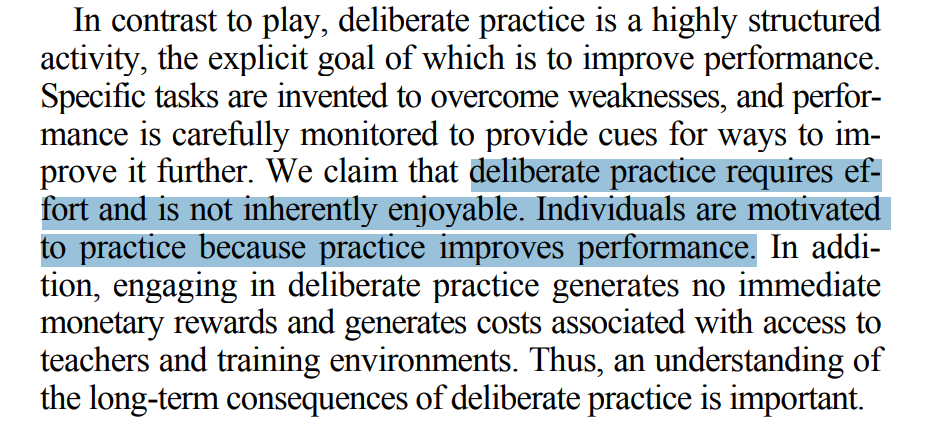The Most Superior Form of Training and the Most Hard-Hitting 2 Sentences in All of Talent Development Research
"...[D]eliberate practice requires effort and is not inherently enjoyable. Individuals are motivated to practice because practice improves performance."
Want to get notified about new posts? Join the mailing list and follow on X/Twitter.
In the field of talent development, there is absolutely no debate about the most superior form of training.
It’s “deliberate practice”: mindful repetition on performance tasks just beyond the edge of one’s capabilities.
Deliberate practice is about making performance-improving adjustments on every single repetition.
Any individual adjustment is small and yields a small improvement in performance – but when you compound these small changes over a massive number of action-feedback-adjustment cycles, you end up with massive changes and massive gains in performance.
Deliberate practice is superior to all other forms of training. That is a “solved problem” in the academic field of talent development. It might as well be a law of physics.
There is a mountain of research supporting the conclusion that the volume of accumulated deliberate practice is the single biggest factor responsible for individual differences in performance among elite performers across a wide variety of talent domains.
(The next biggest factor is genetics, and the relative contributions of deliberate practice versus genetics can vary significantly across talent domains.)
Why, then, does anyone seeking to attain a high level of skill engage in forms of practice other than deliberate practice?
The answer might be the most hard-hitting 2 sentences in all of talent development research:
- "...[D]eliberate practice requires effort and is not inherently enjoyable. Individuals are motivated to practice because practice improves performance."
- -- from Ericsson, Krampe, & Tesch-Romer (1993) in The Role of Deliberate Practice in the Acquisition of Expert Performance

In other words, maximal performance does not happen naturally as a result of maximizing other things like enjoyment, comfort, convenience, and ease of practice.
In fact, maximal performance is at odds with some of these things. Sacrifices must be made.
Lots of people are unwilling to make sacrifices to engage in deliberate practice – and that’s fine. That’s a personal value judgment.
But the problem is that many of these people still claim that they are doing their best to develop their talent.
Typically, they will cut corners on one of the two requirements of deliberate practice – “mindful” and “repetition” – and then resist any form of objective, quantifiable measurement of their performance that would expose the ineffectiveness of their practice.
Deliberate practice is not mindless repetition. If you’re doing the same thing over and over again, then you’re doing deliberate practice wrong.
Deliberate practice is about making performance-improving adjustments on every single repetition.
Any individual adjustment is small and yields a small improvement in performance, but when you compound these small changes over a massive number of cycles, you end up with massive changes and massive gains in performance.
None of this happens if you’re mindlessly doing the same thing over and over again without making adjustments.
Likewise, even if you’re mindful during practice, you can’t skimp on repetition and still call it “deliberate practice.”
Deliberate practice necessitates a high volume of action-feedback-adjustment cycles in every single training session. Otherwise, the compounding doesn’t happen.
Any activity that throttles the number of these cycles cannot be described as deliberate practice.
Many heated debates in math education stem from these misinterpretations of deliberate practice.
Mindless repetition, doing the same thing over and over again without making performance-improving adjustments, is not deliberate practice.
Likewise, any activity that throttles the volume of action-feedback-adjustment cycles (e.g., excessively challenging problems, or think-pair-share type of stuff) is not deliberate practice.
Want to get notified about new posts? Join the mailing list and follow on X/Twitter.